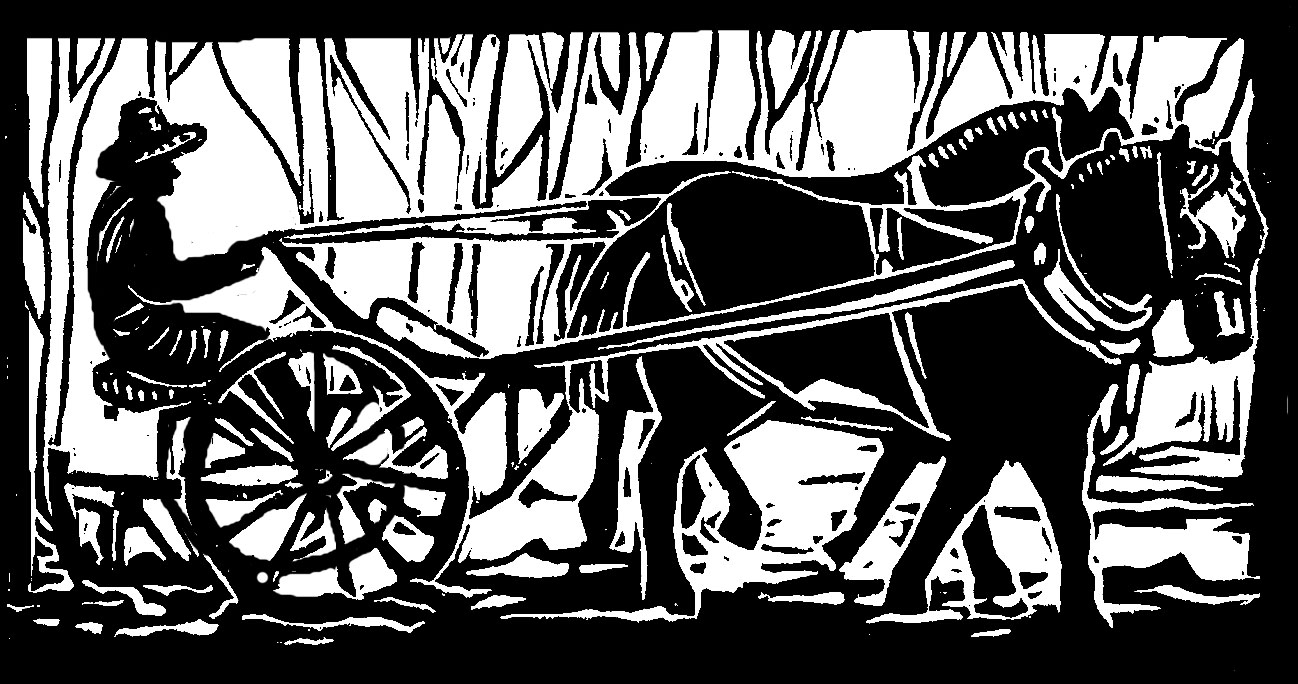Here on our New Hampshire vegetable farm, our workhorses have a nice long lull in the winter. There is a little bringing in of firewood, and a little sap-gathering, but for about two months, our three horses get to loll about in their winter paddock.
They have plenty to eat, with three meals a day, and they have each other as company, and they can go in and out of shelter at will. But in the slow time, our horses seem to like a little something fun to do.
For example, when our kitty comes into the paddock, the horses think of a fine activity: Let's chase the kitty around! Luckily the kitty is fast, agile, and small: she ducks under the barn doors to safety, and peers at the horses' big feet.
Then again, when our nice relatives come visit us just before the New Year, the horses get the treat of a highly alarmed young Border collie on a leash. Who is this tiny shivering barking creature? The horses are not at all alarmed, and since our relatives also have two young children, along with their young dog, we put halters on the horses and give the children a ride around the paddock.
The five and three year old love it, and Molly, who is a very friendly horse, seems pretty happy too. Moon, however, is a little shyer, and wonders what exactly is happening, as the three year old is stretched flat out, in a most unriderly fashion. Moon flicks his ears back and forth nervously.
“He wants to know who's on his back,” I say to my little niece. “Will you say hello to him?” My niece is a very friendly, cheerful, even boisterous little being, usually perfectly willing to let out a good holler, but now she looks at me big-eyed and silent. Her mother, who is walking beside the horse, with a firm grip on her girl's leg, says, “Can you say hi to Moon, honey?”
In the smallest voice I have ever heard from her, my niece says,“Hi.” Not even “Hi, Moon.” Just a tiny little squeak of “Hi.”
Happily, this whisper seems to reassure that Moon that he does not have a panther on his back ready to devour him, and he relaxes a little. Then my fellow farmer and I, who are leading the horses, indulge in some fancy synchronized riding. We make diagonals, and circles, keeping pace with one another, and meeting in the middle. The horses are standing next to each other, and the little boy and the little girl reach way way way out over the big hairy horse bellies and hold hands, in a grand finale.
We pet our nice horses. “Wasn't that some good winter fun?” we say. They hang around until the petting peters out, and then go work on the hay in the mangers.
Of course, the horses' favorite winter fun activities always involve food. There are the Brussels sprouts and cababage and broccoli stalks we pull up in December, and dump in the paddock. The horses come right over to investigate, loving any little bit of fresh green during the hay season. They work all the stalks over with their teeth, and then they work them over with their feet, which is exactly what we were hoping would happen, since it breaks the stalks down for the compost pile.
As the snow gets deeper, we work in the greenhouses, pulling out dead basil and tomato vines. But the best is when we pull out the old pepper plants. There is so much snow that we can't use a wheelbarrow anymore, so we pile the dead plants on a length of plastic and slide them across the snow to the horses' paddock. This is highly exciting, as you can imagine.
The horses prance, they snort, they arch their necks, they prick their ears. This despite the fact that their paddock is right next door to the flopping, snapping in the wind plastic greenhouse, at which they normally don't bat an eye, and despite the fact that they see us work with heaps of dead plants all winter long.
But dead plants on a sheet of plastic! Coming right into the paddock! Now this is some fun! Everybody's got a fine excuse to run around in high spirits. When we dump the plants off the plastic, the horses converge. Let's see, what yummy little bits of fresh grass or weeds are all tangled up in these dead plants? What a great project!
Best of all is when the farmers start sorting their food stored in the root cellar along about February. All kinds of yummy things make it to the paddock: wrinkled carrots, brown apples, tired turnips. The farmers tuck them into odd places, for a curious horse to find. It doesn't take long. But then again, the time for lolling doesn't take long, either, and soon we'll all be back to work, horses and farmers both, instead of making up fun, highly sustainable ways to entertain each other.
Originally published in the Monadnock Shopper News, Feb 14- Feb 20, 2018
